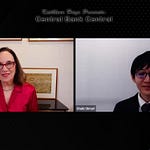Rafael Dalmau has been a fixed income markets professional for decades. In fact when I first met him years ago he was a seasoned emerging markets trader and analyst in New York City. Now from his perch in Singapore as head of APAC Fixed Income Macro Research at ITC Markets, he continues to combine macroeconomic acumen with financial market savvy to analyze one of my favorite topics: central banks.
We spoke after the Bank of Japan held rates steady, citing tariff uncertaintly and downgraded its growth and inflation forecasts downward. This was viewed ahead of the meeting as all but guaranteed as yet another major central bank sees its best path for now as doing notihng on rates until the coast is clear on what happens to tariffs, and what it all means for domestic and global growth.
So dive in and hear how “Raf” is handicapping all the various uncertainties what will determine what the BOJ does, or does not, do next. Why despite all the headwinds Governor Ueda and his team face, they are still committed to their 2% inflation target. Why he raises what may not be such a hypothetical question of what if Japan, Korea and China were to form a trading bloc. Why Japan, with the third largest economy, is in a good position to “weather the storm” that surrounds it.
BOJ sees inflation controlled enough for now 00:00:41:11
Inflation been holding in pretty well in terms of being at the target. That's one thing the BOJ needs to see. That long awaited move now seems to be a long awaited rate hike. But for now, no moves. That was the key thing they said so far.
No surprises at the meeting all as expected 00:00:56:18
Well, I mean, everything that everything they say so far is exactly as you have expected. I think, given the BOJ has been very consistent on his messaging, particularly leaving the door open for rate hikes as inflation remains a little bit sticky in Japan. We saw the Tokyo CPI come in a little bit higher than expected. So they still seeing the normalization path as the base scenario. But of course, now they need to acknowledge that the economy is facing some potential headwinds as we move forward throughout the year.
BOJ downgraded the outlook…no surprise there 00:02:00:22
Well, I mean, they did downgrade the outlook. And I think what's going to be very interesting because when you look at what analysts have been saying, the main focus of the U.S. is going to be the pressure that we're going to get at 230 local time in Tokyo.
Balance from excess inflation Vs outlook for a slowdown 00:03:37:05
The monthly readings just are still way above the 2% higher than that range. So people were questioning how come they were not more aggressive in the <previous January> rate hike. I think they want to have a lot of leeway, a lot of runway in that inflation, 2% sustainability - for that inflation path. Now, despite of all these downgrades of the outlook, nothing has been said recently about the 2% target.
BOJ Committed to 2% 00:04:05:00
So they still believe in the target of 2%. I think to me the most interesting messaging from the BOJ is that despite all these to our downgrade in the outlook, despite of all the potential headwinds that inflation part of that 2% target remains pretty much a still a base case for them.
Impact of tariffs remains a conundrum 00:04:56:23
We don't know when the position is going to shift. Again, you know, there are countries that are finding their way through tariff negotiations.
Amount of uncertainty is much more than expected 00:05:49:00
I don't think anybody thought the magnitude of uncertainty that has come up in the way because this policy has been manifested. So I think every central bank, you know, they've got to be diplomatic on their response to it. And in the messaging they're saying, central banks can only work with facts in (hand), whether the 125% in China will spill over the region and how it's going to affect Japan, what kind of agreements are going to take place if Asia start competing amongst themselves – who knows?
‘Next’ could be very different 00:06:23:17
You know, if Japan in China and South Korea form an economic bloc where they will have some facility to trade with each other with, that supplants some of the some of the effects in the US. And to which degree the substitution of that is some things that we don't know yet until these deals are cemented with the US. And again, given the fact that it's not a clear path. There is a lot of ad hoc events taking place in these negotiations. I just find it very challenging for the central bank to be able to say with any level of certainty this is what we will do. I think the message is clear: if inflation goes to too high of a level, we will raise rates.
Lots of exchange rate uncertainty 00:08:17:00
So if yen weakens drastically, that's not going to be good for inflation. Rate pressure is going to remain at that 2% target. So that may necessitate tightening rates. On the other hand, if the yen strengthens, you know, in a way that is very dramatic, very drastic, then that inflation numbers are going to look vastly different.
Bilateral tariffs become a multilateral story 00:14:55:20
You know, it's fascinating to see what's going on. Clearly, if the US is not likely to go into recession but definitely wants to see a slowdown, I think everybody kind of sees that taking place. If there's a slowdown in the US, of course that is going to create some headwinds to Japan. But again, here comes the key question: what is Japan going to do in terms of trade with Europe? Would that increase with Europe? Would it increase with China? Would it increase <anywhere else>? You know, you've got economies that are quite vibrant out here and that may be a bit of a boost to the economy in places where perhaps they didn't think of before or they didn't think it will be. You know, that was supposed to in you know, obviously in the US being the largest economy, but it's going to be forced to create alliances.
Will ‘neighbor’ trump ‘ally’? 00:15:46:02
Japan is going to be looking for new markets. I do believe that Japan is in a good position to weather the storm, the economic storm a little bit better. This has helped. The economy is still the third largest economy in the world; it is big. Many people forget. You know, it's a sleeping giant for ten years, but it still has a quite large economy and is quite diverse. So I think they're in a good place. You know, they have China as a neighbor. You know, China has their own issues with the US on the trade side of the political side. But, you know, they're going to need to… they're going to become partners, by need, perhaps. And I mean, again, Japan has a lot of complementary elements in that economy compared to those of China.
RAFAEL DALMAU
Highly accomplished senior management professional with vast experience in starting-up and delivering new initiatives and strategies. Collaborative leader/team member with a demonstrable record of building/mentoring high performing global teams; expertise on Product specialist,Portfolio management, Treasury/FX/Cash management, Regulatory and compliance, IT systems, operations. Strong risk management skills.
Progressive career in Trading, Treasury, SWF, Insurance, and investment management with proven (top quartile performance and above Sharpe above 2.0. Vast background on global Macro FI, FX, Derivatives , fixed income, FX, EM, and derivatives.
Identifying new markets, working with technology, cryptocurrencies, payments, product development, and innovative emerging technologies. Senior roles as CIO, COO and head of Asset Management managing institutional, PB/UHNW, pension funds, Sovereign wealth funds, and treasury clients.













Share this post